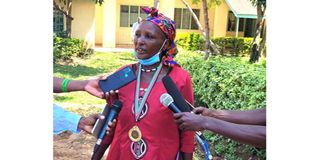Cross-border practice stands in the way of FGM eradication deadline

Juliana Chebor from Mt Elgon at the Bungoma County Commissioner's offices. She was feted for fighting FGM.
What you need to know:
- Five East African countries have endorsed a regional action plan to eliminate cross-border FGM.
- Girls are sneaked into neighbouring countries for the cut and brought back and married off.
Rampant female genital mutilation (FGM) cases in Kuria, Migori County, grabbed the headlines in the mainstream and social media towards the end of 2021.
More than 500 girls were subjected to the cut following the closure of schools for the December holidays.
So far, 57 parents have been charged in court with abetting crime and released on a Sh500,000 bond each. About 94 girls are currently lined up to testify against their parents. No cutter has been arrested, with some victims and perpetrators still hiding in Tanzania for fear of arrest.
In Mabera sub-county alone, more than 40 girls were mutilated and subsequently arrested by the police and detained at children’s homes as cases against their parents commenced.
Sub-county children’s officer Janet Robi justified the arrest of the girls, saying they were to be presented before court as exhibits, hence letting them free would interfere with the cases.
Ms Robi said another 293 girls at risk of FGM were seized and taken to Nyangoge and Sakuri rescue camps before being released after the government and anti-FGM crusaders established that they were safe.
Kenya banned the practice in 2011, paving the way for the Female Genital Mutilation Act, 2011, which carries a minimum punishment of three-year imprisonment and a Sh200,000 fine.
But why is FGM still going on unabated in Kuria and several other areas against the law?
Cross-border FGM is now emerging as a major threat to the fight against the practice, with parents and elders using it to evade prosecution.
Girls living in border areas are sneaked into neighbouring countries of Uganda, Tanzania, Somalia and Ethiopia where they are cut then brought back.
Those embracing cross-border FGM are keen to evade the local punitive law.
Major threat
Anti-FGM Board CEO Bernadette Loloju, in an interview with Nation.Africa, said FGM is rampant in some of the countries, posing a major challenge locally. She blamed cross-border FGM for the surge in cases in Kuria West and Kuria East, which border Tanzania.
“Girls from Kenya are sneaked into Tanzania where they are being cut... Cross-border FGM is real, but my team, together with security agencies, is on the ground to ensure the border is secure,” said Ms Loloju.
She added that the government has beefed up security and put stringent measures at the border points, and warned parents and elders that they will be held liable for any girl subjected to the cut.
“Please, do not take your girls to the neighbouring countries thinking their law will not catch up with you, as it will surely do. We have conducted a lot of anti-FGM campaigns targeting the border communities but still call on politicians and professionals to speak to the elders and parents to abandon this practice,” she said.
Vincent Mwita, an anti-FGM activist in Kuria working with an organisation called Tunaweza Empowerment, said cross-border movements undermine the fight against the cut. He lamented the existence of numerous porous border points.
“Things have calmed down due to our robust campaign for the last few weeks. We are now doing close monitoring to ensure no girl is cut,” he said.
Surveillance hurdles
Domitila Chesang, the founder of I-Am Response Foundation, an organisation campaigning against FGM and child marriages in West Pokot, said cross-border practices are rife in the region.
Chesang regretted that three girls were recently sneaked into Uganda, cut, brought back home and married off. She called for stringent measures and surveillance.
“The only way to eliminate cross-border FGM is by putting up police stations at the border points, which must also have gender desks to handle cases related to gender violence,” she said.
The activist also blamed bad road networks for making it difficult to undertake proper surveillance.
“What is needed now is a robust anti-FGM campaign in these border areas to make the people understand that what they are doing is wrong and just putting the lives of their innocent daughters at risk,” she said.
Peter Kemei, the head of operations at the Men End FGM Foundation, an organisation that rallies men and boys to unite against FGM, child marriage and other harmful practices, emphasised the need to urgently eliminate the menace.
He said cross-border FGM cases could be higher than reported as many of them are conducted secretly.
Regional efforts
The anti-FGM crusaders feel the problem is hampering the realisation of a presidential directive that sought to have Kenya eradicate FGM by 2022, even though campaigns have gained momentum following the launch of Eradication of FGM Policy in November 2019 by President Uhuru Kenyatta.
Five East African countries have also endorsed a regional action plan to eliminate cross-border FGM. Kenya, Uganda, Tanzania, Ethiopia and Somalia are pursuing joint efforts. The framework assists them in implementing international, regional and national commitments to ending FGM.
Data by 28 Too Many, an organisation fighting FGM across the world, show that Kenya’s prevalence is 21 per cent, Uganda (0.3 per cent), Tanzania (10 per cent), Ethiopia (65.2 per cent) and Somalia 98 per cent.
According to Unicef, the five countries alone account for about 25 per cent (48.5 million) of circumcised girls and women globally. The UN body also indicates that about four million girls and women in Kenya have undergone FGM, with 21 per cent of girls and women aged 15 to 49 having been subjected to the practice.





